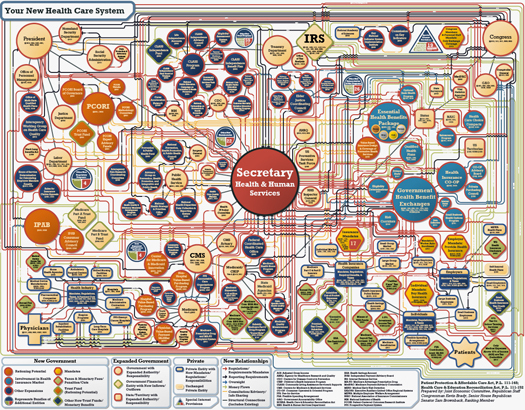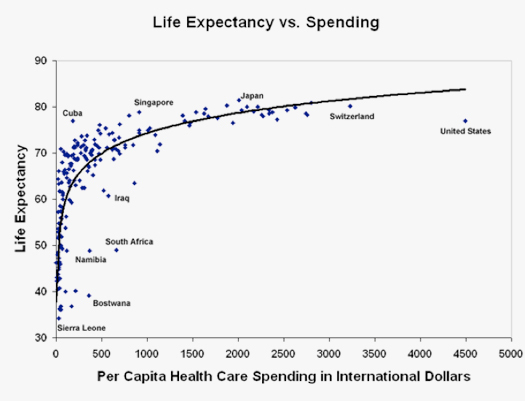A Deutschebank report about health spending in China states that “at less than five per cent of GDP, Chinese expenditure on health is distinctly lower than that of OECD countries. So it would seem a good idea to improve the health system.”
Hmmm. The “problem” the bankers want to solve, is not that Chinese citizens are unhealthy, but that they don't pay vast sums into wasteful medical insurance policies each month. Indeed, it is because they are accustomed to saving cash for medical emergencies that the savings rate is so high in China. This, for banksters, is a problem.
Their proposed solution is to “modernize” China's system so that it catches up with advanced countries such as the US — whose new, post-Obama-reforms system is mapped by the celebrated chart below:

A large version is here.
Each of those bubbles on the chart is a profit centre for someone or other. As Charles Hugh Smith explained recently, of the $2.3 trillion spent yearly in the US on healthcare, roughly $1 trillion goes on overhead: paper-shuffling, insurance fraud, Medicare fraud, lawsuits, counter-claims, etc. Another big chunk is wasted on costly medications that don't work or actually degrade health. It can costs a million dollars per bed to build a hospital. Five administrators for every doctor. And so on.
The result of this advanced system is that Americans live about the same number years, and are about as healthy overall, as Cubans — and Cuba spends 5% per person on their health system compared to the US.

The “improvement” that Deutschebank advocates for China's health system would make its people poorer, if not sicker; and plans along Deutschebank lines are indeed in place for all Chinese to have health insurance by 2020. “Once people no longer have to rely on their own savings for their health protection, consumer spending will increase” drools Deutschebank. “The international health sector is also likely to profit from this.”
No doubt it will. The only downside of that is that when, a few years down the line, a modernized Chinese system begins to bankrupt the country — much as the US system is doing today — Chinese citizens will forced back to — where they are right now.


Comments [4]
Also an interesting bookend to China rolling out its new Stealth fighter, a human-carrying craft that has all the future potential of the great battleships of the 1930s - ie, a ceremonial has-been that props up a major builders of such ornaments world-wide.
Sadly, health care in the US is further resembling the massive hospital building campaigns that took place overseas in connection with oil exploration: a bricks & mortar alternative to guns used to control a population.
One only needs to observe a shiny new dialysis center, being replenished on the hour with corporate-supplied diabetic medicines, to "heal" the increasing obese people feeding at govt. subsidized fast-food facilities to see just one unholy vicious cycle.
01.17.11
12:05
U.S. healthcare funding style is what they are proposing unfortunately... at the behest of insurance companies, the same insurance companies that bought the Republican drive to remove a public option from the Obama initiative.
01.17.11
12:56
cs, You are right that I am not strictly comparing like-with-like. The tough challenge is to focus public [and design] debate on the health *outcomes* we deem, as a society, to be desirable, and affordable - rather than, as now, limit debate to which - among equally ineffective and unafordable inputs - to choose.
01.25.11
03:07
07.06.15
04:10